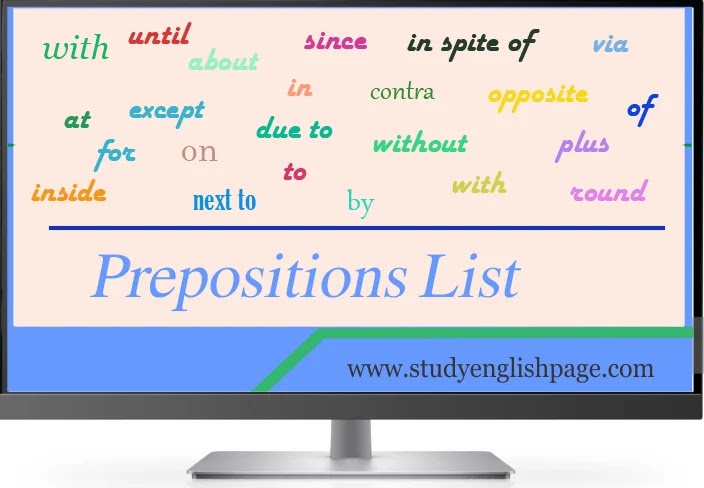Prepositions List
What is a preposition?
The word “preposition” is a part of speech. It is a connector that shows a relationship between a noun, pronoun, or any other part of a sentence. My pen is on the table. There is a preposition (on) in this sentence that shows a relationship between pen and table.
List of alphabetically organized prepositions
The words with asterisk (*) are participle prepositions. They are participles and can be used as prepositions.
The Above Words don’t Always Act as Prepositions
Prepositions are Always in Prepositional Phrases
A preposition is always a part of a prepositional phrase. The function of a preposition is to create a relationship between words (noun, pronoun, or any other word) in a sentence. A preposition is a connector word that functions like a bridge.
- Lisa is going to the park.
The preposition “to” is in the prepositional phrase “to the park”. It creates a relationship between the words “going” and “park”.
Preposition or Adverb
When you get confused about whether any word from the above list acts as a preposition or adverb, you should focus on just one point. The point is to check the word if it is a bridge between a noun and the rest of the sentence.
- We cycled all around.
The word “around” is an adverb because it is not in a prepositional phrase. It is also not a bridge between any words.
You can change it if you add a noun and may add any modifier, too. Check the example below.
- We cycled around the city.
In this example, the word “around” is a preposition because it is in the prepositional phrase “around the city”. Similarly, it is a bridge between the words “cycled and city”.
Preposition or Phrasal Verb
Words from the list above can be added to verbs to form phrasal verbs. In this case, we call the word a particle but not a preposition. How do we know that the word from the list is a preposition or a particle? It is quite simple. We know that a preposition is always in a prepositional phrase. A word from the above list can be only a preposition when it is in a prepositional phrase.
- When she saw me, she got out.
The word “out” is taken from the above list, but it is not a preposition. The word “out” is not in a prepositional phrase. Similarly, it is not a bridge between any two words.
Here, it is a particle of the phrasal verb “get out”. The two words in combination form a new word “get out” that gives a different meaning.
- One person peeked out the hole.
In this example, the word “out” is a preposition. It is in the prepositional phrase “out the hole”, and it is a bridge between peeked and hole.
Preposition or Conjunction
Some words from the list can act as conjunctions. It means that the words in the list are not always prepositions.
- I bought a new car for my son.
- I cannot meet him today, for it rains here.
In the first example, the word “for” is a preposition that is in the prepositional phrase. On the other hand, the word “for” in the second example is not a preposition. It is a conjunction because it joins two clauses.
Related Topic:





0 Comments